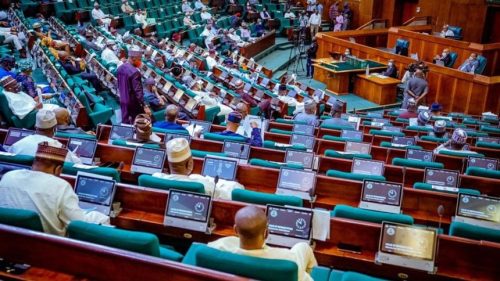Kachikwu v Baru face-off – Matters Arising

Svetlana Alliluyeva, the youngest child and only daughter of ruthless Soviet dictator, Joseph Stalin once famously said that “the one good thing about not seeing you is that I can write you letters.”
In whatever form or name it comes, whether letter, memo or missive, the act of writing letters to those in authority appears to have become a new norm among the political class in Nigeria. The practice was arguably initiated or revived by former President Olusegun Obasanjo who fired an 18 pager to then President Goodluck Jonathan accusing him of driving the country to the precipice and allowing deceit, corruption and mutual distrust to tear at the fabric of the nation, amongst other accusations.
It was therefore unsurprising when fake news turned to rumours, and then reality, that it was revealed that the Minister of State for Petroleum Resources, Mr. Ibe Kachikwu, had written a letter to President Muhammadu Buhari (who doubles as the substantive Petroleum Minister) accusing the Group Managing Director of Nigerian National Petroleum Corporation (“NNPC”) Dr. Maikanti Baru, of insubordination and a blatant disregard for due process in the award of contracts and the appointment of NNPC officials.
In the letter dated 30 August, 2017 and entitled, “Re: Matters of insubordination and lack of adherence to due process perpetuated by the GMD NNPC, Dr. Baru,” Kachikwu essentially accused Mr. Baru of illegality by awarding contracts worth about $25 billion (N9 trillion) without following due process in consulting the Board of NNPC (which Kachikwu chairs) in the award of contracts. He also alleged that he became aware of massive changes within the NNPC through the media just like many other Nigerians, whereas the NNPC Board – which the NNPC Act empowers to review and ratify these appointments – was never briefed. Kachikwu asked President Buhari to save the office of the Minister of State from further humiliation and disrespect by compelling all parastatals to submit to its oversight, regulatory mandate and proper supervision; and save the NNPC and the oil industry from collapse arising from the non-transparent practices in the Baru-led NNPC. He also asked the President to suspend the recently announced reorganisation changes in the NNPC.
A few days after Mr Kachikwu’s letter came to light, on 9 October, the NNPC responded to the various allegations and just stopped short of calling the Minister a liar. In his response, the NNPC GMD admitted to the charge of not consulting Kachikwu or the NNPC Board in the award of the now controversial contract, but sought to justify that on the basis that said consultations were not necessary since he got the requisite approvals from President Muhammadu Buhari. His case is that under the relevant legal regimes, the award of contracts do not require a review or discussion with the Minister of State or the NNPC Board, rather what is required is the processing and approval of contracts by the NNPC Tenders Board (which Baru chairs), and depending on the threshold, the President [in his capacity as President or as Minister of Petroleum] or the Federal Executive Council.
The letter exchange between Kachikwu and Baru gave fillip to a cascading number of wild but predicatable conspiracies like the existence of a cabal in the seat of power, and raised a number of mind boggling concerns including questions of why a sitting minister (never mind a junior minister) would resort to the option of writing a letter to get the attention of his President whom he should ordinarily interface with on a daily, or at least weekly, basis; and why the head of a government agency under the supervision of a ministry appeared to have more direct access to the President than i supervising minister. While the above concerns have been the subject of other interventions, this analysis aims squarely to deal with the legal issues implicated in the whole scenario and interrogate some of the positions taken by the parties in this drama, against the backdrop of current Nigerianlaw. Before then however, it is necessary to offer a brief explanation of some relevant legal principles which run through the jurisprudence of most constitutional democracies in the world, such as Nigeria, on the basis of which these issues will be addressed.
The most important principle of law in Nigeria is that of the supremacy of the Constitution which states that the Constitution is the supreme law of the land as enshrined in Section 1(1) and (2) of the Constitution. Nigerian courts have consistently held that all actions of the government in Nigeria are governed by the Constitution and where any law or rule is inconsistent with the Constitution, then such law or rule shall, to the extent of their inconsistency be null and void. A related concept is the doctrine of the Rule of Law which provides that everything must be done in accordance with the law, that government should be conducted within the framework of recognised rules and principles and that no person no matter how highly placed is above the law. This doctrine has also affirmed by the courts in many cases.
It is through the prism of the constitution’s supremacy and the doctrine of the rule of law that the actions and utterances of Ibe Kachikwu as well as Dr Baru will be viewed. Some sections of the NNPC Act are relevant in this regard and are reproduced below:
- (1) …
(2) The affairs of the Corporation shall, subject to Part II of this Act, be conducted by a Board of Directors of the Corporation which shall consist of a Chairman and the following other members, that is-
(a) …;
(b) the Managing Director of the Corporation; and
(c) ….
(3) The Chairman shall be a Minister in the Government of the Federation to be known and styled as the Minister of Petroleum Resources.
(4) …
- (1) There may be appointed by the President an Alternate Chairman who may, pursuant to any general or special delegation given in that behalf by the Minister exercise the powers conferred upon the Minister or Chairman under this Act:
Provided that nothing in the foregoing shall be construed as preventing the exercise by the Minister himself of any power so delegated. -
(1) There shall be appointed by the National Council of Ministers, a Managing Director of the Corporation who shall be the chief executive officer of the Corporation and shall, subject to Part II of this Act, be responsible for the execution of the policy of the Corporation and the day-to-day running of the Corporation’s activities and its associated services.
The above sections essentially provide that the Managing Director of the NNPC shall be responsible for the day-to-day running of the Corporation while the Board, headed by a Chairman, shall be responsible for conducting the affairs of the Corporation. Above all, while the NNPC Act states that the Minister of Petroleum shall be the Chairman of the NNPC Board, the President however has powers to appoint an Alternate Chairman who may, exercise the statutory powers of the minister or chairmant.
Part of Baru’s defence was that the NNPC contracting process was governed by the NNPC Act and the Public Procurement Act, 2007 which spell out the procurement method and thresholds of application. According to him, the authority to approve contracts resides with the NNPC Tenders Board, except for contracts above the threshold of N2.7 billion or $20 million which require the approval of the President or the Federal Executive Council, subject to the receipt of a certificate of no objection from Bureau for Public Procurement. Baru also cited a circular from the Secretary to the Government of the Federation of 11 March, 2009 with Reference No. SGF/OP/1/S.3/VIII/57, which spell out the composition of Tenders Board.
However, Baru’s letter only succeeds in raising more questions than answers. For instance, a report by online newspaper, Premium Times gave a timeline of the corporation’s procurement process and brought to fore the fact that as on 10 July and 31 July, 2017, when President Buhari supposedly approved contracts for the NNPC worth $1 billion and $780 million, respectively, the President was away on medical vacation receiving treatment for undisclosed ailments in London, and relinquished presidential powers to his Vice President having transmitted a letter to this effect to the National Assembly. This, in turn calls into question the legality of actions taken by the President during the period in question, in particular, the validity of the contracts. It also raises the question of the role of the Minister of State for Petroleum if the NNPC GMD could announce far reaching reorganisation of the Corporation without the input of the Minister and bypass him to secure contract approvals.
It is worth remembering that President Buhari named Ibe Kachikwu as the Chairman of the NNPC Board on 4 June 2016, the same day Baru was appointed as the top executive at the NNPC. Granted that the NNPC Act states that the Minister of Petroleum Resources (in this case President Buhari) is the appropriate person to occupy the position of Chairman of the NNPC Board, as a public official and an appointee of the President, it hardly lies in the mouth of Baru to contend that the President cannot validly appoint Ibe Kachikwu as the Chairman of the NNPC Board. That amounts to taking the law into one’s own hand or acting as a judge in one’s own cause – practices which our adjectival laws frown against. Until a court of competent jurisdiction invalidates the appointment of Ibe Kachikwu as the NNPC board chairman, he remains such.
Furthermore, it is a core principle of administrative law that a person exercising executive powers may delegate such powers to another person. In fact, the NNPC Act envisages a situation where the President may appoint another person as [an alternate] Chairman of the NNPC Board to exercise the powers concurrently with the Minister of Petroleum Resources.
Above all, the Constitution, as the supreme law of the land, states in Section 5 that executive powers resides in the President and in Section 148 that the President may, in his discretion, assign to the Vice President or any Minister of the Government of the Federation, responsibility for any business of the Government of the Federation including the administration of any department of government. The President in his discretion appointed Ibe Kachikwu as the Chairman of the NNPC Board, to oversee the administration of the department of government known as the NNPC. Baru’s attempt to take refuge under the NNPC Act or the Public Procurement Act to justify the alleged acts of insubordination levelled against him is therefore a non-starter.
In a not too unrelated development, a former President of the Nigerian Bar Association (NBA), Olisa Agbakoba, SAN challenged the constitutionality of the President also holding office as the Minister of Petroleum in the Federal High Court, Abuja on grounds that it contravenes the provisions of Section 138 of the Constitution of the Federal Republic of Nigeria, 1999 (as amended) which disqualifies the President of Nigeria from holding any other executive office or paid employment.
In view of the fact that the suit is still before the courts, this analysis will make no value judgement calls on the merits of that case. This is not to say that the case is not without force. On one hand, Agbakoba contends that the office of a Minister is an executive office and by Section 138 of the Constitution, the President cannot hold another executive office contemporaneously with holding the Presidency. He also argued that by section 147(2) of the Constitution, a person cannot hold the office of a Minister without Senate approval, because the section employs the peremptory word, “shall.” On the other hand, there is equally some merit to the argument that executive powers already resides in the President and he could exercise such powers himself or through Ministers. It is also doubtful whether “any other executive office” referred to in section 138 of the Constitution extends to the office of a Minister.
In the final analysis, notwithstanding which side of the divide you belong, there ought to be a general consensus that the entire episode has not portrayed the Buhari administration in a positive light. A situation where a sitting Minister would resort to writing a letter to get the attention of his President whom he should ordinarily interface with on a daily, or at least weekly, basis lends credence to the recurring concerns of the preparedness of the APC-led government before winning the 2015 election. In all of this, it must be noted that the President has not seen the import of addressing this issue, directly or indirectly.
While the executive branch looks to resolve this needless spat in the interest of the country and to save the oil industry as a whole from collapse, Nigerians may as well look forward to another high profile letter from another member of the political class. After all, if you cannot see a person, you can simply write him a letter.










